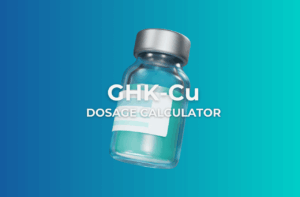SIGN UP FOR WEEKLY INSIGHTS & TIPS
Our Peptide Resources

Melanotan 1 vs Melanotan 2: Are These Peptides Effective for Tanning?
This article is for informational purposes only and does not constitute medical advice. Always consult with a qualified healthcare provider before considering any peptide therapy. The pursuit of a sun-kissed

Best Peptides for Menopause: Hormone Balance and Relief
This article is for informational purposes only and does not constitute medical advice. Always consult with a qualified healthcare provider before considering any peptide therapy. Menopause triggers a cascade of






BPC-157 Timing: When and How to Take BPC-157 for Maximum Results


Bodybuilder’s Guide To Safe Peptides For Muscle Building In 2025
Explore Our Content
- Anti-Aging
- Athletic Performance
- Biohacking
- Cognitive Health
- Collagen Peptides
- Copper Peptides
- Energy
- Immune Health
- Muscle Growth
- Peptide Bioregulators
- Peptide Comparison
- Peptide Dosages
- Peptide Stacks
- Peptides
- Peptides for Healing
- Peptides for Women
- Podcast
- Sexual Health
- Skin Health
- Sleep
- Uncategorized
- Weight Loss
- Anti-Aging
- Athletic Performance
- Biohacking
- Cognitive Health
- Collagen Peptides
- Copper Peptides
- Energy
- Immune Health
- Muscle Growth
- Peptide Bioregulators
- Peptide Comparison
- Peptide Dosages
- Peptide Stacks
- Peptides
- Peptides for Healing
- Peptides for Women
- Podcast
- Sexual Health
- Skin Health
- Sleep
- Uncategorized
- Weight Loss
OUR COMMITMENT
Evidence-Based Peptide Education You Can Trust
In a field saturated with dubious claims, we serve as your reliable source for scientifically-backed peptide information. We make cutting-edge peptide research accessible to everyone—without compromising accuracy.
We transform complex peptide science into clear, actionable information. Our mission is to empower researchers, clinicians, and health-conscious individuals with evidence-based peptide education—free from hype and misinformation.
Research-Backed Content
Expert Medical Review
Clear, Actionable Guides
Medical Authority
Skip the Hype. Get Real Peptide Science.
Join thousands getting accurate, research-backed peptide information from medical professionals—not influencers.
Frequently Asked Questions
All content is medically reviewed by Dr. Michael Fortunato, MD, a board-certified anesthesiologist with advanced certification in Bioidentical Hormone Replacement Therapy (BHRT).
Dr. Fortunato specializes in peptide therapy and hormone optimization protocols. Every article is backed by peer-reviewed scientific literature and clinical studies to ensure medical accuracy.
Research peptides are bioactive amino acid chains studied for their therapeutic potential but not yet approved by the FDA for human use. Unlike FDA-approved peptide medications (such as insulin or semaglutide), research peptides are legally designated for laboratory research purposes only.
These compounds are investigated in clinical trials and scientific studies to understand their mechanisms of action, safety profiles, and potential health applications. Many peptides currently classified as “research” compounds show promise in areas like longevity, metabolic health, and tissue repair—but lack the regulatory approval required for prescription use.
Our content educates readers on the existing scientific evidence for these compounds while clearly distinguishing between research applications and FDA-approved therapeutic uses.
Our sole focus is providing accurate, evidence-based education. While many peptide sites rely on anecdotal claims or influencer opinions, we source exclusively from peer-reviewed journals, clinical trials, and vetted academic research. This means you get unbiased information, not sales pitches.
Many peptides discussed on our site are classified as research compounds, meaning they’re intended for laboratory research purposes. We clearly distinguish between FDA-approved peptides and research compounds.
Our content includes safety considerations, potential risks, and contraindications. Always consult a qualified healthcare provider before using any peptide therapy.
We follow a rigorous editorial process: research from peer-reviewed sources, medical review by Dr. Fortunato, fact-checking against current clinical data, and regular updates as new research emerges. If a study’s findings are preliminary or conflicting research exists, we note these limitations. Our goal is accuracy, not hype.
Our content is educational, not medical advice. While we provide comprehensive, research-backed information about peptides, we can’t account for individual health conditions, medications, or risk factors.
Think of us as your starting point for understanding peptide science—then consult with your healthcare provider for personalized medical guidance.
We provide in-depth guides on peptides for anti-aging, weight loss, athletic performance, skin health, cognitive function, injury recovery, and more. Each guide explains the mechanisms of action, relevant research, dosing considerations, and safety profiles.
We also compare similar peptides to help you understand which might be most appropriate for specific research applications or health goals.
